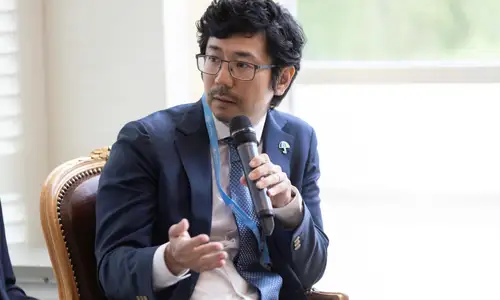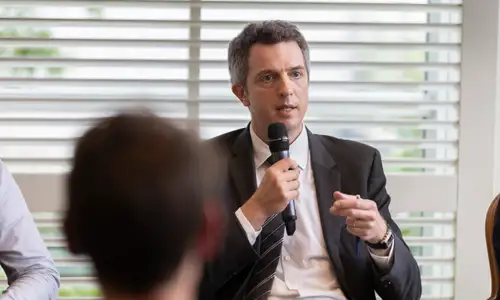GIF convenes expert panel on how to address scaling climate-health innovation.
By Sarah Richardson
May 28, 2025
Together with our colleagues at PATH, the Global Innovation Fund hosted a panel discussion on how to address scaling health innovations, on the sidelines of the recent 78th World Health Assembly in Geneva.
Dr Vincent Bretin, Director of Climate & Results at Unitaid, Vanina Laurent-Ledru, Director General of Foundation S, Mayur Shetty, CEO of start-up Blackfrog, and Dr Akihito Watabe, Health Specialist at the Asian Development Bank contributed to a lively discussion addressing the urgent need for financing to develop and scale holistic solutions to health challenges, exacerbated by climate change. This expert panel was skillfully moderated by Dr Marina Belén Romanello from Lancet Countdown, and attracted an audience of stakeholders across the health and climate value chains, including government and policymakers, funders, and implementing and locally founded private sector organisations.

The speakers explored how catalytic investment in African and Asian early-stage health ventures can bridge critical gaps in public health delivery, particularly in the face of rising climate threats. The panel highlighted the power of integrating financial and technical support to unlock sustainable innovation that complements strained public systems.
Here are five key take aways from the session:
Climate change is a public health emergency. For over 20 years, its deadly toll has been clear. Since 2020, climate-driven impacts have caused four million deaths — including 180,000 each year from heat, accelerated half of all infectious diseases, and helped fuel 2024’s record-breaking 14 million dengue cases.
By 2050, climate change will claim 15 million more lives, and drive a fivefold spike in heat-related deaths. Half a billion more people will face mosquito-borne diseases. For every 1°C rise in global temperatures, psychosocial disorders increase by 2%. The most vulnerable — Low- and Middle-Income Countries (LMICs) across Africa and Asia — will bear 80% of the burden.

Vanina Laurent-Ledru, Director General, Foundation S Health systems aren’t ready. Climate shocks knock out power, destroy infrastructure, disrupt supply chains, and drain healthcare workforces. Yet only one in four health systems use climate data to adapt — and just $7.1 billion has been committed to climate and health, with less than half reaching low-income countries. The world needs resilient, climate-smart health systems.

Mayur Shetty, CEO, of climate-health innovation Blackfrog Proven technologies exist to address climate-health challenges. Technological innovations within the private sector are emerging as critical tools in addressing the intertwined challenges of climate change and health, much like how technologies have driven significant progress in climate mitigation. From energy-efficient med-tech and solar-powered cold chains, disease detection and prevention tools, and medical devices to remote diagnostics and early warning systems and climate-resilient supply chains, these innovations have the potential to save lives and strengthen health systems in climate-vulnerable regions.
Market failure is thwarting promising climate-health start-ups. Solutions that could fill urgent health gaps are underfunded, under-supported, and often underutilised. Most promising early-growth stage health companies in Africa and Asia struggle to raise capital. Systemic barriers—such as limited funding, barriers to market entry, policy gaps and a fragmented ecosystem—prevent climate-health innovations from large-scale adoption and reaching the most vulnerable populations.

Dr Akihito Watabe, a Health Specialist at the Asian Development Bank It’s time for collective action to turn potential into impact. There is a need for clear and practical mechanisms that enable the scale-up of climate and health innovations. These include innovative financing models, policy shifts, community-centred approaches, business models and ecosystem partnerships.
It is in response to these challenges that PATH and GIF have partnered to launch Thrive, a US$120 million impact and technical assistance fund. Thrive bridges the innovation-financing and technical gap by offering patient capital and holistic, multi-dimensional support to scale tech solutions for the most climate-vulnerable.
Thrive presents a unique opportunity to invest in local entrepreneurs developing high-potential innovations that offer targeted interventions where public systems fall short, especially under stress from climate change.
Thrive will be made open for support from donors, multilaterals, philanthropic organisations, and development finance institutions.

